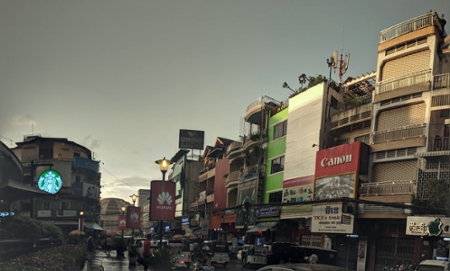June 28

Hard to imagine, but this week marks the half-way point of my internship here in Cambodia. I’ve already been here for five weeks and have another five to go, which will hopefully be as enjoyable as the first half has been. I spent last weekend in Phnom Penh and have just been researching during the week, so I’m afraid there aren’t many pictures of exotic locations in this post.
My research is progressing as usual, which means I’ve been spending most of the work week hunting down English translations of Cambodian Laws, and then figuring out what they mean. This week I’ve been working on laws around protecting the environment and sustainable development, which has been interesting to learn about in this context. The Cambodian Environmental Law that’s currently in effect was passed in 1996, and is about 6 pages long. If you don’t know anything about legal documents, that is very short for a law that is supposed to provide the legal structures for an entire ministry overseeing a lot of government regulation. The Ministry of Environment here has sporadically updated the regulations over the years, but there’s a real need for the law itself to be reformed. Fortunately, there’s been a draft law in progress since 2015. Unfortunately, it’s gone through about 11 drafts and doesn’t appear to be any closer to being implemented. Stronger environmental codes that are actually enforced would let authorities get a hold of the rapid pace of development here, but it’s hard to say if or when that would happen.
I was researching the specifics of the Ministry of the Environment because I’ve been working on a smaller report this week related to current events in Cambodia. Last Saturday, there was a tragic accident when a building under construction collapsed in the coastal city of Sihanoukville. Almost 30 people died in the accident and a similar number were injured. You may have even heard of the accident because several western news outlets picked up the story. I was in Sihanoukville a few weeks ago, and honestly it doesn’t surprise me at all. The city has been absolutely overtaken by these big developments and I’d imagine what authorities there are have a very hard time monitoring all those projects.
It’s been a total shock to Cambodians because while this country’s labor standards are lax to the point of non-existence, an accident like this has never happened here. Cambodians have been able to think of their country as different from places like Bangladesh, where similar development happens but major construction accidents are more common. The unbridled development that’s happening in the country has only really been going on for less than a decade, so it’s still new to a lot of local Cambodians. The idea that the many building sites all over the country could be this dangerous has really worried the public, many of whom work in the construction sector.
As with everything in Cambodia, there are some complicated politics in play surrounding the accident as well. In an effort to show how seriously the government is taking the accident, at least three high level government officers, including the Governor of the province, have lost their jobs. Additionally, the Prime Minister himself has paid the families of the victims anywhere from $10,000 to $70,000, which goes a long way here. However, the collapsed building was Chinese-funded and apparently the developers didn’t have a building license. The developer had even been warned twice by the authorities that the building site was unsafe, but was able to pay off the relevant government officials to get around Cambodian law.
All of that means that this incident has stirred up local worries about both local corruption and the bigger issue of Chinese investment and influence. There are concerns that the Chinese have provided so much development money here that the relationship between the two countries is really unbalanced, and that while China has a huge influence over the government it doesn’t really care about the Cambodian people. One of the reasons China has been able to get a foothold here is because US and European Aid money has been cut back because of human rights abuses against the press and political opposition. US efforts to coerce the government to change haven’t really worked because China has been happy to provide the aid money that we’ve stopped providing, and they couldn’t care less about freedom of the press. Still, the Chinese government isn’t particularly popular with the average Cambodian, and this accident has just worsened their reputation in the country.
That’s been the big news here this week, and has occupied most of my time. Next week, back to the usual research, but first I’ll be spending this weekend in Siem Reap to check out Angkor Wat.